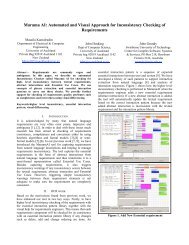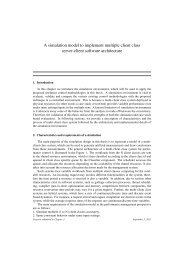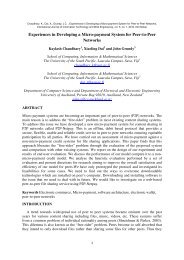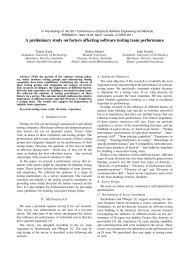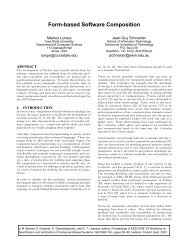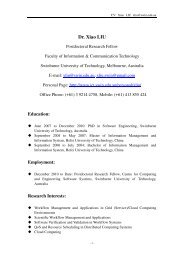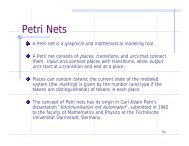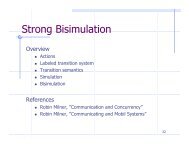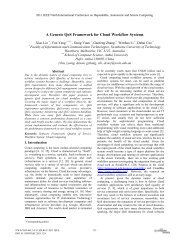- Page 1 and 2:
A Rationale-based Model for Archite
- Page 3 and 4:
maintenance. These techniques can h
- Page 5 and 6:
Declaration This thesis contains no
- Page 7 and 8:
2.2.6 DoD Architecture Framework .
- Page 9 and 10:
5.4.6 Risk assessment in architectu
- Page 11 and 12:
8.2 The architecture rationalisatio
- Page 13 and 14:
12.2 Contributions . . . . . . . .
- Page 15 and 16:
6.10 ≪AR≫ and ≪AAR≫ Stereot
- Page 17 and 18:
11.13A Process to Synchronise Chang
- Page 19 and 20:
5.13 Design Rationale Helps Evaluat
- Page 21 and 22:
that architecture design is highly
- Page 23 and 24:
1.2. Research motivations and resea
- Page 25 and 26:
1.2. Research motivations and resea
- Page 27 and 28:
1.4. Structure of the thesis the ch
- Page 29 and 30: Part I Problem Analysis 10
- Page 31 and 32: 2.1. Industry practice of design ra
- Page 33 and 34: 2.2. Architecture frameworks and de
- Page 35 and 36: 2.2. Architecture frameworks and de
- Page 37 and 38: 2.2. Architecture frameworks and de
- Page 39 and 40: 2.2. Architecture frameworks and de
- Page 41 and 42: 2.2. Architecture frameworks and de
- Page 43 and 44: Chapter 3 Related work in design ra
- Page 45 and 46: 3.2. Why do we need design rational
- Page 47 and 48: 3.2. Why do we need design rational
- Page 49 and 50: 3.3. Existing methods for capturing
- Page 51 and 52: 3.3. Existing methods for capturing
- Page 53 and 54: 3.3. Existing methods for capturing
- Page 55 and 56: 3.3. Existing methods for capturing
- Page 57 and 58: 3.4. Other related studies 3.3.7 Qu
- Page 59 and 60: 3.4. Other related studies evolutio
- Page 61 and 62: 3.5. How well design rationale meth
- Page 63 and 64: 3.5. How well design rationale meth
- Page 65 and 66: Chapter 4 Research methodology and
- Page 67 and 68: 4.1. Software engineering research
- Page 69 and 70: 4.2. The chosen research and valida
- Page 71 and 72: Part II Architecture Design Rationa
- Page 73 and 74: on a regular basis. Their inputs ha
- Page 75 and 76: 5.1. Architecture rationale in the
- Page 77 and 78: 5.2. Survey methodology data collec
- Page 79: 5.3. Survey findings experience). I
- Page 83 and 84: 5.3. Survey findings Business Goals
- Page 85 and 86: 5.3. Survey findings 5.3.5 Document
- Page 87 and 88: 5.3. Survey findings Table 5.8 summ
- Page 89 and 90: 5.3. Survey findings We used Spearm
- Page 91 and 92: 5.3. Survey findings previous desig
- Page 93 and 94: 5.4. Discussion of findings Since t
- Page 95 and 96: 5.4. Discussion of findings or cons
- Page 97 and 98: 5.5. Limitations and use design rat
- Page 99 and 100: Part III The Representation and App
- Page 101 and 102: 6.1. A conceptual model for design
- Page 103 and 104: 6.2. Architecture Rationale and Ele
- Page 105 and 106: 6.2. Architecture Rationale and Ele
- Page 107 and 108: 6.3. Architecture elements Figure 6
- Page 109 and 110: 6.4. Architecture rationale Figure
- Page 111 and 112: 6.4. Architecture rationale • ris
- Page 113 and 114: 6.4. Architecture rationale depicts
- Page 115 and 116: 6.5. The extended AREL To prevent c
- Page 117 and 118: 6.6. A UML representation of AREL a
- Page 119 and 120: 6.6. A UML representation of AREL a
- Page 121 and 122: 6.7. AREL usability AE by ≪AEsupe
- Page 123 and 124: 6.8. Summary The AREL model is exte
- Page 125 and 126: 7.1. The EFT system reasoning, a co
- Page 127 and 128: 7.1. The EFT system The processing
- Page 129 and 130: 7.1. The EFT system not chosen beca
- Page 131 and 132:
7.1. The EFT system Figure 7.5: Int
- Page 133 and 134:
7.1. The EFT system sequence checki
- Page 135 and 136:
7.1. The EFT system Figure 7.7: Dec
- Page 137 and 138:
7.1. The EFT system Therefore, in a
- Page 139 and 140:
7.1. The EFT system Figure 7.10: De
- Page 141 and 142:
7.2. An empirical study to validate
- Page 143 and 144:
7.2. An empirical study to validate
- Page 145 and 146:
7.2. An empirical study to validate
- Page 147 and 148:
7.2. An empirical study to validate
- Page 149 and 150:
7.2. An empirical study to validate
- Page 151 and 152:
7.3. Summary The case study is spec
- Page 153 and 154:
8.1. Background Based on these assu
- Page 155 and 156:
8.2. The architecture rationalisati
- Page 157 and 158:
8.2. The architecture rationalisati
- Page 159 and 160:
8.2. The architecture rationalisati
- Page 161 and 162:
8.2. The architecture rationalisati
- Page 163 and 164:
8.3. Other applications of ARM As d
- Page 165 and 166:
8.3. Other applications of ARM Figu
- Page 167 and 168:
8.3. Other applications of ARM area
- Page 169 and 170:
Chapter 9 Architecture rationale an
- Page 171 and 172:
9.1. Background 9.1 Background In t
- Page 173 and 174:
9.2. Traceability of architecture r
- Page 175 and 176:
9.4. AREL and eAREL traceability ap
- Page 177 and 178:
9.4. AREL and eAREL traceability ap
- Page 179 and 180:
9.4. AREL and eAREL traceability ap
- Page 181 and 182:
9.4. AREL and eAREL traceability ap
- Page 183 and 184:
9.4. AREL and eAREL traceability ap
- Page 185 and 186:
Chapter 10 Architecture decision de
- Page 187 and 188:
10.1. Background 10.1.2 Introductio
- Page 189 and 190:
10.2. Building a BBN to represent a
- Page 191 and 192:
10.2. Building a BBN to represent a
- Page 193 and 194:
10.2. Building a BBN to represent a
- Page 195 and 196:
10.2. Building a BBN to represent a
- Page 197 and 198:
10.3. Reasoning about change impact
- Page 199 and 200:
10.3. Reasoning about change impact
- Page 201 and 202:
10.3. Reasoning about change impact
- Page 203 and 204:
10.3. Reasoning about change impact
- Page 205 and 206:
10.3. Reasoning about change impact
- Page 207 and 208:
10.3. Reasoning about change impact
- Page 209 and 210:
10.5. Summary design object may cau
- Page 211 and 212:
11.1. Capturing architecture design
- Page 213 and 214:
11.1. Capturing architecture design
- Page 215 and 216:
11.2. Checking AREL models Figure 1
- Page 217 and 218:
11.3. Tracing AREL models Figure 11
- Page 219 and 220:
11.4. Analysing AREL with BBN • S
- Page 221 and 222:
11.5. Limitations Figure 11.13: A P
- Page 223 and 224:
Chapter 12 Conclusions 12.1 Summary
- Page 225 and 226:
12.2. Contributions reasoning metho
- Page 227 and 228:
12.2. Contributions implementations
- Page 229 and 230:
12.3. Future work architecture deci
- Page 231 and 232:
12.3. Future work to examine the co
- Page 233 and 234:
BIBLIOGRAPHY [10] B. W. Boehm, Soft
- Page 235 and 236:
BIBLIOGRAPHY [37] A. Eden and R. Ka
- Page 237 and 238:
BIBLIOGRAPHY [62] J. D. Herbsleb an
- Page 239 and 240:
BIBLIOGRAPHY [89] N. Lassing, D. Ri
- Page 241 and 242:
BIBLIOGRAPHY [115] D. L. Parnas,
- Page 243 and 244:
BIBLIOGRAPHY [142] Z. Simsek and J.
- Page 245 and 246:
BIBLIOGRAPHY [167] W. F. Tichy, N.
- Page 247 and 248:
Appendix A AREL Tool User Manual 1
- Page 249 and 250:
4.1 AREL Check Model When the Check
- Page 251 and 252:
4.2 AREL Model Tracing AREL model t
- Page 253 and 254:
Figure 9 - result of downward trace
- Page 255 and 256:
To initiate the graph’s creation,
- Page 257 and 258:
onto the diagram 14 Assign values t
- Page 259 and 260:
Useful Definitions The following ar
- Page 261 and 262:
) Some projects only c) Not at all
- Page 263 and 264:
19. I revisit architecture design d
- Page 265 and 266:
Complaint Procedure If you have any
- Page 267 and 268:
Privacy Protection Only investigato
- Page 269 and 270:
B. Exploring design reasoning. 1. W
- Page 271 and 272:
3. Why does the system use asynchro
- Page 273 and 274:
C. General Comments on AREL Modelli
- Page 275:
IEEE Computer Society Press. A. Tan





